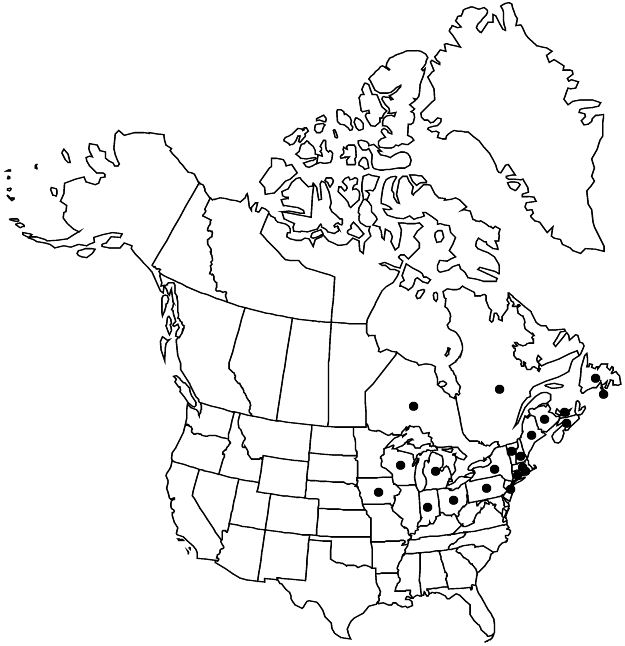Potentilla intermedia
Syst. Nat. ed. 12, 2: 351. 1767.
Mant. Pl. 1: 76. 1767.
Stems ascending to erect, 2–5 dm. Basal leaves palmate or ternate. Cauline leaves 3–8, proximal ones (3–)5–14 cm; proximal petioles (1–)2–10 cm, long hairs sparse to common, spreading to loosely appressed, 1–2 mm, weak, short or crisped hairs sparse to common, cottony hairs absent, glands absent or sparse; leaflets usually 5, central one oblanceolate to obovate, 2–4.5 × 1–2.5 cm, margins ± flat, distal 3/4+ usually unevenly, sometimes evenly, incised 1/3–2/3 to midvein (often with 1–2 incisions nearly to midvein), teeth 5–10 per side, surfaces similar or ± dissimilar, abaxial green to grayish green, long hairs sparse to common (especially on veins), 0.5–1.5 mm, soft to weak, short or crisped hairs ± sparse, cottony hairs absent, glands absent or sparse, adaxial long hairs absent or sparse, 1 mm, short hairs absent or sparse, crisped and cottony hairs absent, glands absent or sparse. Inflorescences 20–100+-flowered. Pedicels 0.5–1.5(–2.5) cm. Flowers: epicalyx bractlets lanceolate to ovate or elliptic, 2–5 × 0.8–1.5 mm, lengths usually 2/3, sometimes 1, times sepals; sepals 3.5–6.5 mm, apex ± acute; petals 3–5 × 2–3 mm; filaments 0.8–2 mm, anthers 0.3–0.5 mm; carpels 40–70, styles 1–1.2 mm, scarcely papillate-swollen proximally. Achenes 1 mm, rugose. 2n = 28, 56 (Eurasia).
Phenology: Flowering late spring–summer.
Habitat: Dry waste places along roadsides, ditches, other open sites, in grasslands, oak and conifer woodlands
Elevation: 0–300 m
Distribution

Introduced; St. Pierre and Miquelon, N.B., Nfld. and Labr. (Nfld.), N.S., Ont., P.E.I., Que., Conn., Ind., Iowa, Maine, Mass., Mich., N.H., N.J., N.Y., Ohio, Pa., R.I., Vt., Wis., Eurasia.
Discussion
Potentilla intermedia is more common than P. inclinata at least in eastern Canada and New England.
Selected References
None.